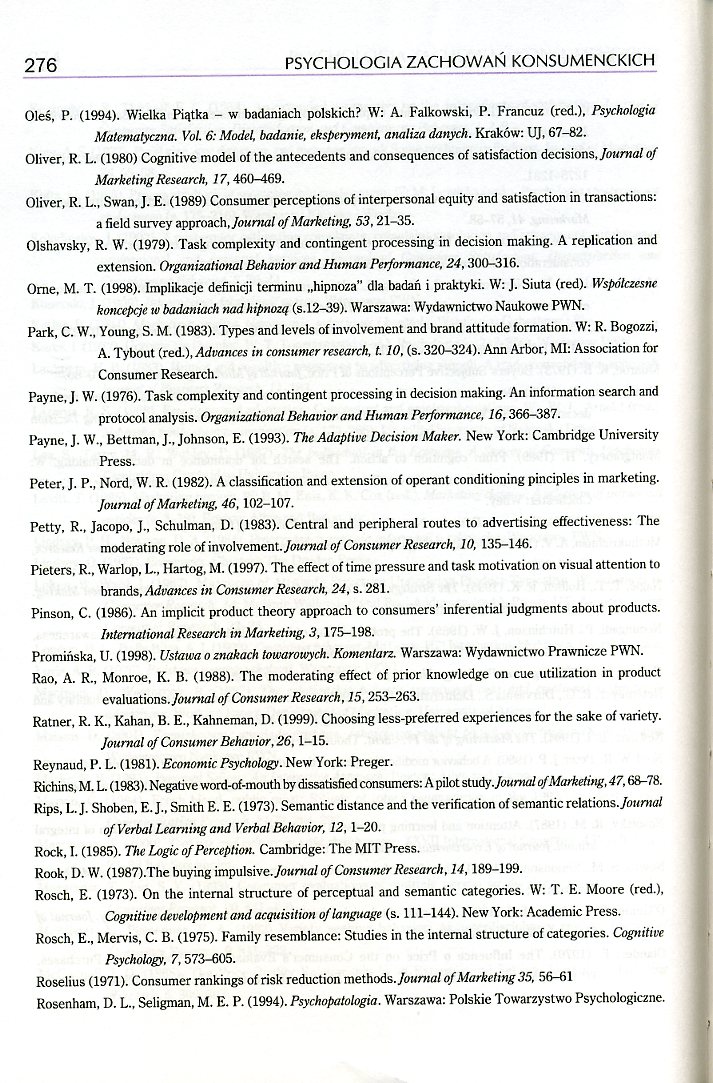PZK276

276 PSYCHOLOGIA ZACHOWAŃ KONSUMENCKICH
Oleś, P. (1994). Wielka Piątka - w badaniach polskich? W: A. Falkowski, P. Francuz (red.), Psychologia Matematyczna. Vot. 6: Model, badanie, eksperyment, analiza danych. Kraków: UJ, 67-82.
01iver, R. L. (1980) Cognitive model of the antecedents and consequences of satisfaction decisions./oMrwćrt of Marketing Research, 77,460-469.
01iver, R. L., Swan, J. E. (1989) Consumer perceptions of interpersonal eąuity and satisfaction in transactions: a field survey approach Journal of Marketing, 53,21-35.
01shavsky, R. W. (1979). Task complesdty and contingent processing in decision making. A replication and extcnsion. Organizational Behavior and Humań Performance, 24,300-316.
Ome, M. T. (1998). Implikacje definicji terminu „hipnoza” dla badań i praktyki. W: J. Siuta (red). Współczesne koncepcje w badaniach nad hipnozą (s.12-39). Warszawa: Wydawnictwo Naukowe PWN.
Park, C. W., Young, S. M. (1983). Types and levels of involvement and brand attitude formation. W: R. Bogozzi, A. Tybout (red.), Advanc.es in consumer research, 1.10, (s. 320-324). Ann Arbor, MI: Association for Consumer Research.
Payne, J. W. (1976). Task complexity and contingent processing in decision making. An information search and protocol analysis. Organizational Behaoior and Humań Performance, 16,366-387.
Payne. J. W., Bettman, J., Johnson, E. (1993). TheAdaptwe Decision Maker. New York: Cambridge University Press.
Peter, J. P., Nord, W. R. (1982). A classification and extcnsion of operant conditioning pinciples in marketing. Journal of Marketing, 46, 102-107.
Petty, R., Jacopo, J., Schulman, D. (1983). Central and peripheral routes to advertising effectiveness: The moderating role of involvement. Journal of Consumer Research, 10, 135-146.
Pieters, R., Warlop, L., Hartog, M. (1997). The effect of time pressure and task motivation on visual attention to brands, Admnces in Consumer Research, 24, s. 281.
Pinson, C. (1986). An implicit product theory approach to consumers’ inferential judgments about produets. International Research in Marketing, 3, 175-198.
Promińska, U. (1998). Ustawa o znakach towarowych. Komentarz. Warszawa: Wydawnictwo Prawnicze PWN.
Rao, A. R., Monroe, K. B. (1988). The moderating effect of prior knowledge on cue utilization in product evaluations,/<!>wm<z/ of Consumer Research, 15,253-263.
Ratner, R. K., Kahan, B. E., Kahneman, D. (1999). Choosing less-preferred experiences for the sake of variety. Journal of Consumer Behaoior, 26,1-15.
Reynaud, P. L. (1981). Economic Psychology. New York: Preger.
Richins, M. L. (1983). Negative word-of-mouth by dissatisfied consumers: A pilot study .Journal of Marketing, 47,68-78.
Rips, L. J. Shoben, E. J., Smith E. E. (1973). Semantic distance and the verification of semantic relations./oi/rHtf/ of Verbal Leaming atid Verbal Behauior, 12, 1-20.
Rock, I. (1985). The Ij)gic of Perception. Cambridge: The MIT Press.
Rook, D. W. (1987).The buying impuIsiye./oKrwtf/of Consumer Research, 14,189-199.
Rosch, E. (1973). On the internal structure of perceptual and semantic categories. W: T. E. Moore (red.), Cognitine deuelopment and acąuisition oflanguage (s. 111-144). New York: Academic Press.
Rosch, E., Mervis, C. B. (1975). Family resemblance: Studies in the internal structure of categories. Cogtiitiee Psychology, 7,573-605.
Roselius (1971). Consumer rankings of risk reduction methods./ewrwa/ of Marketing 35, 56-61
Rosenham, D. L., Seligman, M. E. P. (1994). Psychopatologia. Warszawa: Polskie Towarzystwo Psychologiczne.
Wyszukiwarka
Podobne podstrony:
PZK060 60 PSYCHOLOGIA ZACHOWAŃ KONSUMENCKICH Natomiast definicja marketingu według Ph. Kotlera (1994
PZK230 230 PSYCHOLOGIA ZACHOWAŃ KONSUMENCKICH ło się to przy promocji produktów podlegających modzie
PZK124 124 PSYCHOLOGIA ZACHOWAŃ KONSUMENCKICH zakupu produktu, który jest zbyt tani, gdyż sądzi, że
CCF20091108�000 Psychologia zachowań konsumenckich bada interakcje pomiędzy konsumentami a organizac
PZK124 124 PSYCHOLOGIA ZACHOWAŃ KONSUMENCKICH zakupu produktu, który jest zbyt tani, gdyż sądzi, że
PZK000 Andrzej Falkowski Tadeusz Ty!szka Psychologia zachowań konsumenckich
PZK001 Psychologia zachowań konsumenckich
PZK006 6 PSYCHOLOGIA ZACHOWAŃ KONSUMENCKICH 3. MOTYWACJA I EMOCJE W MARKETINGU
PZK008 8 PSYCHOLOGIA ZACHOWAŃ KONSUMENCKICH 9.5.2. Skojarzenia przy rozszerzaniu
PZK012 12 PSYCHOLOGIA ZACHOWAŃ KONSUMENCKICH Interesujące i ważne jest wreszcie także to, co się dzi
PZK014 14 PSYCHOLOGIA ZACHOWAŃ KONSUMENCKICH 0 zachowaniach konsumenckich). Gdy ch
PZK016 16 PSYCHOLOGIA ZACHOWAŃ KONSUMENCKICH spostrzegania reklam. Przecież codziennie docierają do
PZK018 18 PSYCHOLOGIA ZACHOWAŃ KONSUMENCKICH ■ Ramka 1.1 mmmmmmmmm—mm Kiedy mówimy, że czyjeś spojrz
PZK020 20 PSYCHOLOGIA ZACHOWAŃ KONSUMENCKICH • zmniejszania (downsizing) wymiaru produktu. Pierwsza
PZK022 22 PSYCHOLOGIA ZACHOWAŃ KONSUMENCKICH wm—mmmm^mmm Ramka 1.2 mm—m^^^m W teoretycznym opisie pr
więcej podobnych podstron